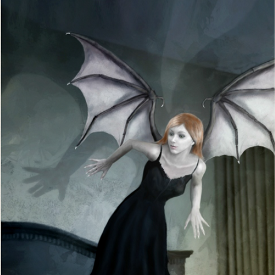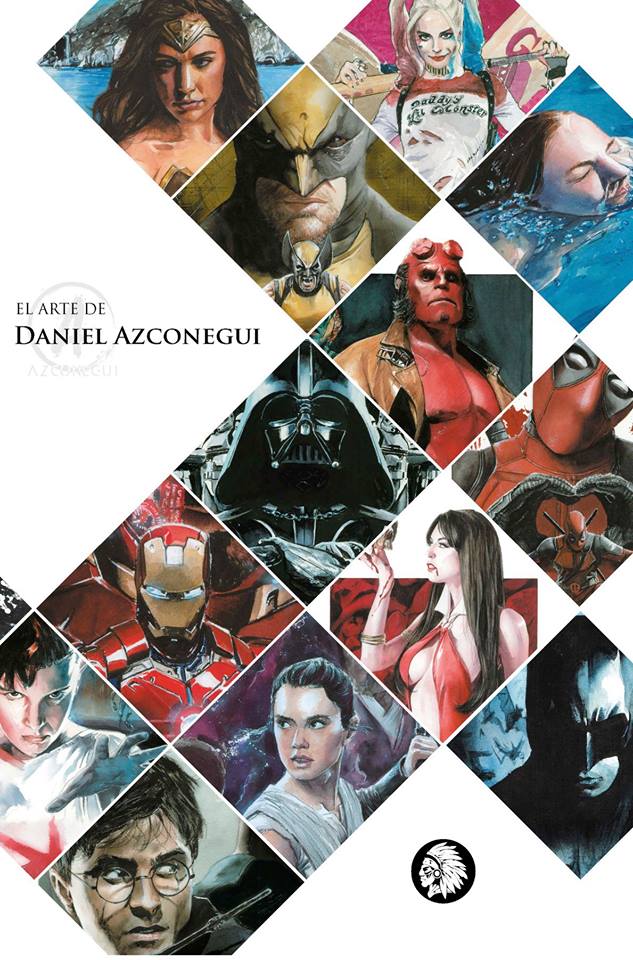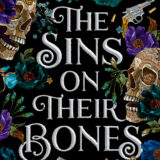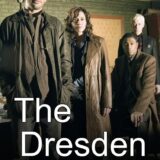For better or worse religion has been a part of the human experience since our earliest days. Even in these increasingly secular days we still feel religion’s impact; if only in the ways it has shaped our history and culture. For centuries religion inspired great works. Perhaps it’s only natural that religion often finds its way into speculative fiction. That brings us to the subject of today’s edition of The Audio File. We’ll be looking at speculative fiction stories that have to do with religion.
Speculative fiction’s relationship with religion is somewhat complicated. It’s often said that science fiction has more atheist authors than any other genre. I’m not sure if that’s necessarily true, but I suspect that the majority of science fiction authors have atheist leanings. Fantasy, by contrast, certainly seems to attract more writers of faith. It could possibly be instructive to go back to the roots of modern speculative fiction: atheistic writers such as Asimov and Clarke vs. devout writers like Tolkien and Lewis.

On the other hand, it’s not quite that black and white. Asimov consider himself culturally Jewish and Clarke had a soft spot for Buddhism. Their contemporary Ray Bradbury was non-denominational Christian, and we all know about L. Ron Hubbard’s relationship with religion. Today atheist authors Lev Grossman, China Mieville and the late Terry Pratchett are some of the biggest name in fantasy. Writers as a group can lean a certain way, but there will always be outliers or those who don’t fit the mold.
Now this is obviously a very touchy subject, but I’m going to do my best to stay neutral. I did my best to cast as wide a net as possible and feature as many religions or points of view as possible. All of this is brought to us by the good people at Escape Pod, PodCastle, Cast of Wonders, The Drabblecast and Lightspeed Magazine.
Well nothing more that I can add, so let’s get this show on the road…
“Why I Bought Satan Two Cokes On The Day I Graduated High School” by Nathaniel Lee
Narrated by Dave Thompson
Originally Published in Unidentified Funny Objects 3
This story takes places in a world where angels have descended from Heaven and rule Earth as a benevolent dictatorship. War and strife are things of the past and humanity couldn’t be happier under the rule of the angels. Despite all of this, the protagonist of our story finds himself dissatisfied with the world. He’s struck up something of an odd friendship with Satan, who is a mere shadow of his former self. Everyone is required to pledge their allegiance to a particular angel, and soon it will be time for our protagonist to make his choice. Of course, Satan is technically an angel.
This story contains some excellent world building. You really get a sense of who the individual angels are and the impact they’ve had on the world. It’s also very well researched, since all angels mentioned in the story are actual angels from Christian belief. One thing I did find interesting was that, though the story appears to take place after the Second Coming, God and Jesus aren’t mentioned even once. The story still works perfectly well without them, but it did seem like an odd omission.
You can look at the protagonist’s conflict from two points of view. The first is that you can see it as asking if it is preferable to live as a slave or die as a free person. The second is that you can see it as an allegory for wrestling with faith and doubt, especially in the context of events such as Confirmation or Bar Mitzvahs. This story really spoke to all of those feelings I experienced going through Confirmation in the United Methodist Church. The scene when the protagonist notes how young some of the kids pledging service to the angels are really struck a chord with me. It always seemed kind of insane to ask a bunch of sixteen year-olds to make such a big decision, though as I’m now an atheist you can see how it turned out for me. Nathaniel has stated that the story was inspired by his own wrestling with faith back when he was a Christian.
A story this heavy needs a narrator who can rise to the challenge. Dave Thompson coined the term spiritual noir for stories like this. It was only natural that he’d act as narrator, and what a performance he gives.
“Why I Bought Satan Two Cokes On The Day I Graduated High School” is a story about faith, doubt and finding your own path. Very much recommended.
“The Pilgrim and The Angel” by E. Lily Yu
Narrated by Rajan Khana
Originally Published in McSweeney’s Quarterly 45
This story follows a man named Fareed Halawi. He owns a coffee shop in Cairo and has led a good life. The only thing he really wants is to go on the Hajj to Mecca. One day he is visited by the angel Gabriel who has been sent by Allah himself to take Fareed on the Hajj. Before long Gabriel transforms into a flying carpet and the duo are of on their journey.
Okay, the description isn’t much, but this is a pretty good story. It was nice to see a story centered around Islam that didn’t try to lecture me about how I ought to view the religion or its followers. It was a central part of the story, but the story never made a big deal out of it. Overall it’s a really heartwarming story about a kind old man getting a well-earned reward. Plus you can potentially learn quite a bit about what the Hajj entails.
Some readers have complained that Fareed didn’t do all the steps, and thus didn’t complete his Hajj, when he asks Gabriel if they can visit his son in Florida. Considering that Gabriel only put up a token resistance, and given that Allah didn’t strike him with a lightning bolt, I’d say it probably counted just fine. It’s also worth noting that most pilgrims on Hajj don’t do so while flying on carpets that are also angels, so there’s that.
As for the narration, I thought that Rajan did a great job. “The Pilgrim and The Angel” is a lovely little story that I’m sure you’ll enjoy.
“The MSG Golem” by Ken Liu
Narrated by Anaea Lay
Originally Published in Unidentified Funny Objects 2
This story takes place on a starship cruise liner that his bound for the planet New Haifa. It follows a Chinese-American girl named Rebecca who discovers that she is a descendant of the Kai Fang Jews of China. She finds this out because God himself tells her so. A group of rats have snuck aboard the ship, and they’ll wreak havoc on New Haifa’s ecosystem if they aren’t caught in time. God has given Rebecca the task of rounding up the rats, but that might be a bit more difficult than He bargained for.
Nine times out of ten when you see Jews in media they’ll be Ashkenazi. So it was nice to see a story centered around Kai Fang Jews. I enjoyed how God was portrayed as having the personality of a stereotypical crabby old Jewish man. All of the times that Rebecca and God got into arguments about Torah were really funny as well. It reminded me of those jokes where God and Moses get into arguments about how to interpret the Jewish law. It’s also nice to see science fantasy stories getting some representation.
Anaea Lay can be a bit hit-and-miss with her narration, but for this story she does a really great job. “The MSG Golem” is a very funny story that also has a lot of heart. I recommend it.
“Judgment of Swords and Souls” by Saladin Ahmed
Narrated by Stephenie Morris
Originally Published in Intergalactic Medicine Show
This story is set in the world of Saladin Ahmed’s Crescent Moon Kingdoms. It’s a fantasy world modeled after the Middle East during the Golden Age of Islam. The story takes place at the Lodge of God, a monastery of sorts for a group of holy warriors known as Dervishes. The story follows a young dervish named Layla. She was orphaned as a child, but was taken in by a high ranking dervish named Shaykh Saif. Layla has become Saif’s prize student, and they’ll need each other now more than ever. Another shaykh named Zaid is challenging Saif for control of the lodge. It will test their closeness to God and their students’ skill with the sword.
This religion of The Crescent Moon Kingdoms is fictional, but it is heavily based upon Islam. If fact, it’s pretty much Islam in all but name. It’s easy to read this story as a parable about the ways in which religion is twisted for ill gain, as well as the rise of extremism and fanaticism. Shaykh Zaid is obsessed with getting the entire Lodge of God behind his interpretation of the Heavenly Chapters, which is basically their equivalent of the Koran. This parallels the rise of many Radical Islamic regimes throughout history.
On a lighter note, it was refreshing to see a fantasy world that wasn’t based on Medieval Europe. I also thought the Dervish culture was well fleshed out. I loved how they used two-pronged swords to symbolize how they aim to cleave right from wrong. Layla was a well written and strong female character. In terms of narration I thought that Stephenie did a really great job.
“Judgment of SDwords and Souls” is a story about standing up for your beliefs even when the world stands against you. I recommend it.
“Where Virtue Lives” by Saladin Ahmed
Narrated by Rajan Khana
Originally Published in Beneath Ceaseless Skies
Here’s another story set in the Crescent Moon Kingdoms. This one follows Doctor Adoulla Makhslood, the last ghul hunter in the city of Dhamsawaat. He’s recently taken a dervish named Raseed as his apprentice. They’re as different as night and day. Raseed is incredibly pious and uptight, while Adoulla is more laid back and easy going. They’re going to have to put aside their differences to take down a ghul that’s been causing problems.
What I liked most about this story is the way that it contrasted Adoulla and Raseed’s views on faith and piety. It’s the opposite of what you might expect given the characters’ ages. There’s also a lot of subtlety to their attitudes. Adoulla may be somewhat lax in his observance of religion, but he gets his magic powers by quoting verses from the Heavenly Chapters. Raseed is so devoted to the cause of the Dervishes that he’s blinded to just how corrupt they’ve become. This is especially poignant if you’ve just finished “Judgement of Swords and Souls”. This does lead to plenty of humorous moments, such as when Raseed makes a big speech about the importance of religious devotion, only for Adoulla to ask when the last time he got laid was.
The story contains plenty of other humorous moments: Adoulla has enough tea jokes to put Uncle Iroh from Avatar: The Last Airbender to shame. Plus you get some good old fashion sword-and-sorcery action, and there’s the commentary about faith and religion. You need just the right sort of narrator for a story like this, and Rajan more than delivers.
What can I say? “Where Virtue Lives” is a good time all around, one you won’t want to miss.
“The Streets of Ashkelon” by Harry Harrison
Narrated by Paul Boehmer
Originally Published in New Worlds
This story follows a man named Garth who runs a trading outpost on a distant planet. The planet is inhabited by hairy salamander-like aliens known as the Wesker. They only have a Stone Age level of technology, but they’re fast learners. Over the years Garth has grown to view the Wesker almost like his children. One day, a rocket arrives carrying a Catholic priest named Father Mark, who has come to evangelize the Wesker. Although initially reluctant, Garth allows the priest to interact with the Wesker. The Wesker are incredibly literal minded, and Garth worries about what effects organized religion will have on them.
This is one of Harry Harrison’s most well know stories, so I’m going to assume that you guys know how it ends. It’s pretty difficult to talk about this story without talking about the ending. If you don’t know, and you don’t want anything spoiled, skip to the next story on the list.
Okay, with that out the way let’s move on. There’s several levels of tragedy to this story. There’s the tragedy of Father Mark with his death coming about because of the misunderstandings caused by his evangelism. It kind of reminds me of those stories about missionaries who went to far-off Pacific islands and, due to not grasping the local customs, wound up as the main course for dinner. Then, there’s the tragedy of the Wesker who have committed a murder. Their tragedy is particularly sad because they didn’t realize the priest would die if they crucified him. It’s also sad because they seemed to be getting along perfectly fine without religion in their lives.
Finally, we have Garth’s tragedy. I got the feeling that the whole thing could have been avoided if he’d spoken up sooner. Granted, he probably had no idea the Wesker would go as far as they did in order to see if what the priest told them was true. On the other hand, he does repeatedly warn the priest that things aren’t going to end well. Even though he doesn’t agree with Father Mark he at least ties to tolerate him. Perhaps he did want the priest to get knocked on his ass, but he certainly never wanted to see him get killed.
“The Streets of Ashkelon” is easily Harry Harrison’s best short story. A story this famous and grand needs a narrator who can make it feel just as fresh as when it was first published. Thankfully, Paul more than delivers with his performance. All in all it’s a classic story that is still well worth your time.
“The Way of Cross and Dragon” by George R. R. Martin
Narrated by Stefan Rudnicki
Originally Published in Omni
1980 Hugo Award Winner
This story is set in the far-future where humanity has spread to the stars and has come into contact with many different alien races. Human religion has also spread to many worlds. The One True Interstellar Catholic Church of Earth and the Thousand Worlds, in particular, has been doing pretty well for itself. Controversy has erupted because of a heretical sect that has made Judas Iscariot into a saint. The Church has dispatched a priest named Damien Har Veris to meet with Lukyan Judasson, the founder of the heretical movement. Har Veris has been wavering in his faith and he finds himself drawn to the sect’s holy book “The Way of Cross and Dragon”.
Yes, believe it or not George R. R. Martin has written more than just A Song of Ice and Fire. It’s always interesting to see how religions change and adapt in science fiction settings, and this story was no exception. The Judas cult, their beliefs and holy book all felt very fleshed out. There’s also a lot of commentary about the power religion has to influence societies. There’s also a very strong theme about doubt and the questioning of faith, which really resonated with me. I can’t really add too much more without giving the story away, but it is well worth your time. You can also find this story over on StarShipSofa.
Stefan did a great job with the narration as always. A story about faith, doubt and the power of religion to shape civilization. Well worth checking out.
“The Stars Below” by Ursual K. Le Guin
Narrated by Stefan Rudnicki
Originally Published in Orbit 14
This story is set in a low fantasy world somewhat similar to ours during the Renaissance. It follows an astronomer named Guennar who has been forced to hide in a mineshaft after he is branded a heretic and his observatory is burned to the ground. Despite this, he remains faithful both to his God and to his work as a scientist. In time he comes to love the mine and its many wonders. He also befriends a group of miners and hopes to teach them about the wonders the mine contains.
Okay, not the best of summaries, but the story is quite good. You definitely see parallels to the life of Galileo Galilei. As such, there is certainly an underlying theme of science vs. religion to this story. There’s also a strong current about the awe and wonder that come from science and its discoveries. The story seems to suggest that religion could have an even more enriching worldview if it could only get over its fear of science. The journeying through the mine could be seen as a metaphor for the process of seeking knowledge and making discoveries. There’s lots of symbolism and metaphors, and the story invites you to make your own conclusion about them.
Once again Stefan does a great job with the narration. An elegant story with many layers to unpack, and many interpretations to find.
“Hiranyagarbha” by Kevin Jared Hosein
Narrated by Vikas Adam
Featured in Lightspeed’s People of Color Destroy Science Fiction
This story takes place on the island of Trinidad and follows a man named Balgobin. He and his friend Yadav have discovered a strange gold substance in the Caroni Swamp. The substance appears to come from nowhere and it completely engulfs everything it touches. Yadav gets some on himself and soon doctors from around the world, as well as a few sleazy reality shows, are descending on Trinidad to search for the truth. All the while, Balgobin can’t help but wonder if he is witnessing the rebirth of the world.
Again, the summary doesn’t do the story nearly enough justice, but I promise you it is well worth your time. Hiranyagarbha refers to the creation of the world from a golden egg in Hindu Mythology. The Caribbean actually has a fairly large Hindu population, though you don’t often see them represented in the media, so it was nice that this story depicted that, as well as Trinidad culture in general. I loved the way this story poked fun at pseudoscience shows such as Ghost Hunters and their ilk.
If I did have one criticism it would be that this really felt more like a fantasy story than a science fiction story. The mysterious gold substance isn’t given any kind of explanation and it just feels supernatural in nature. Now normally I’d let that slide, but this was part of an issue of Lightspeed dedicated to science fiction, not fantasy. This is really a minor issue, though, and doesn’t really detract from the story.
In terms of narration I thought that Vikas did a great job. “Hiranyagarbha” is a story that explores lesser known cultures, one that I recommend to you.
“Come All Ye Faithful” by Robert J. Sawyer
Narrated by Mike Boris
Originally Published in Space Inc and collected in Identity Theft and Other Stories
This story follows the only Catholic priest on Mars. In fact, he’s pretty much the only person of faith at Bradbury Colony. He’s not especially popular with the other colonists, but he does his best to take it in stride. One day he’s contacted by the Church to investigate claims made by a televangelist about the possible appearance of the Virgin Mary on Mars.
I’ll preface this by saying that I do not have a particularly positive view of ordained clergy. Therefore, it is a testament to Robert’s skill as a writer that he was able to make me sympathize with the main character. I will say I was a bit confused as to why he was on Mars in the first place. It was mentioned the Church thought it was important to get a priest on Mars, and that the priest had done work with the Vatican Observatory, but it just didn’t add up. We never see the priest do any scientific work, only typical priestly things like holding mass or performing marriages. Presumably it would have cost a lot of money to get NASA to send the priest, and that probably would have hurt the Church’s public image quite a bit. Plus it’s not like there’s any Martians to evangelize.
That’s not the say I didn’t enjoy the story. Like most of Robert J. Sawyer’s work, I enjoyed it quite a bit. I liked the way that the society of the colonists is depicted. For example, they all wear very bright and gaudy colors because of how monochrome Mars is. One of the recurring themes in Robert’s works is of the intersection between science and religion. It is always interesting to see what new perspective his works will bring.
No Robert J. Sawyer story is complete without a good narrator, and Mike is the narrator “Come All Ye Faithful” needed. Another great Robert J. Sawyer story you won’t want to miss out on.
“Rejiggering the Thingamajig” by Eric James Stone
Narrated by Kij Johnson
Originally Published in Analog
This story follows a sentient tyrannosaurus named Bokeerk. She’s a children’s author on her way to an intergalactic book fair. Unfortunately, due to a teleporter accident, she’s been transported to a planet where pretty much everything is out to get her. Bokeerk is a Buddhist pacifist, but reluctantly she teams up with a sentient gun to journey to safety.
Okay, yeah, this story is a little crazy. That being said, it is a good sort of crazy. A lot of the plot and humor comes from the vastly contrasting views of Bokeerk and the gun. I also liked the way Bokeerk’s Buddhist beliefs were depicted. For example, she only eats meat that has been grown in vats in compliance with the belief that all life is sacred. There’s really not too much more to add to this one. Just some good old-fashioned space opera fun with a Buddhist T-Rex and a talking gun.
I can add that I thought that Kij did a great job with the narration. “Rejiggering the Thingamajig” is a fun little listen that I’m sure you’ll enjoy.
“The Star” by Arthur C. Clarke
Narrated by Norm Sherman
Originally Published in Infinity Science Fiction
This story follows a Jesuit priest who is also an astrophysicist. He’s part of a crew investigating the remains of an alien civilization in another star system. The star having gone supernova fascinates the priest. It isn’t long before he makes a discovery that shakes his faith to the core.
This one’s pretty much impossible not to spoil, but it’s also one of the most well-known of Clarke’s stories. I doubt there’s many of you who don’t know the twist, but if not I’m going to give it to you straight. The star isn’t just any star, it’s the Star of Bethlehem. The implication being that God killed a perfectly peaceful civilization to announce the birth of his son. Alternatively, it suggests that perhaps there isn’t any God. The story leaves the reader to draw their own conclusion.
“The Star” is certainly a powerful story, and quite well written, but the fact that the twist is so well known works against it. To make a story this well-known work, you need to find a way to tell it fresh. Thankfully, The Drabblecast really pulled out all the stops when it came to the production of this episode. Norm’s narration certainly proved effective.
It’s considered a classic for a reason, and you really should give it a listen.
“A Nice Jewish Golem” by Ao-Hui Lin
Narrated by Sondra Harris
Originally Published in Jersey Devil Press #25
This story follows an old Jewish woman named Mrs. Levine. Her son Yeshua is a happily adopted golem, but he longs to find love. After a trip to an interfaith conference, he falls in love with a girl who is something of an Inuit equivalent of a Golem. Even the rabbi who made Yeshua approves of their union, but Mrs. Levine had been hoping Yeshua would find a nice Jewish girl. Will Yeshua ever get his mother to accept his new girlfriend?
A new boyfriend or girlfriend having a different religion tends to be a deal breaker for even the most open-minded parents. This story felt like a fantasy version of that sort of scenario. I loved the banter between Mrs. Levine and Yeshua. I imagine Jewish mothers and sons have been having such conversations for centuries, and it felt very authentic. You usually see golems used in serious stories, so it was nice to see them in something lighter for a change. “A Nice Jewish Golem” is funny, argumentative and had a lot of heart.
Sondra really nailed it with her narration. She really has the perfect Jewish mother voice. Oy vey, I think you’re gonna like this one.
“Gift Cards of an Ex-Goddess” by Melissa Embry
Narrated by Christiana Ellis
A Cast of Wonder Original
This story follows a girl named Mala who is currently serving as the avatar of a goddess. Soon it will be time for a new girl to become the avatar of the goddess. Mala decides to flee the temple with as many offerings as possible, but it isn’t long before the goddess to-be’s mother is hot on her trail. Mala strikes up a deal with the skeleton warrior temple guard, and soon the unlikely duo are off on whirlwind big city adventure.
I thought we could finish up with something on the lighter side. Believe it or not this story has a basis in fact. There is a group of Hindus in Nepal who believe their goddess is reincarnated as a young girl, but after the girl reaches a certain age the goddess moves on to another girl. I loved Mala’s freewheeling and devil-may-care personality. I also enjoyed the skeleton’s sarcastic and snarky personality. It nice to see some Urban Fantasy in a non-Western setting. It’s a really fun story and I’m sure you’ll enjoy it quite a bit.
I will say that I thought that Christiana did a perfect job with the narration. Go ahead and give “Gift Cards of an Ex-Goddess” a listen. You’ll be glad you did.
Conclusion
Well here we are at the end of the list once again. I hope you’ve had a good time and that you’ve found some great stories to listen to. As usual, if there are any topics you’d like to see in future editions of The Audio File, let me know and I’ll put them on the rotation. Or if there’s a story you’d like me to review I’ll certainly check it out.










